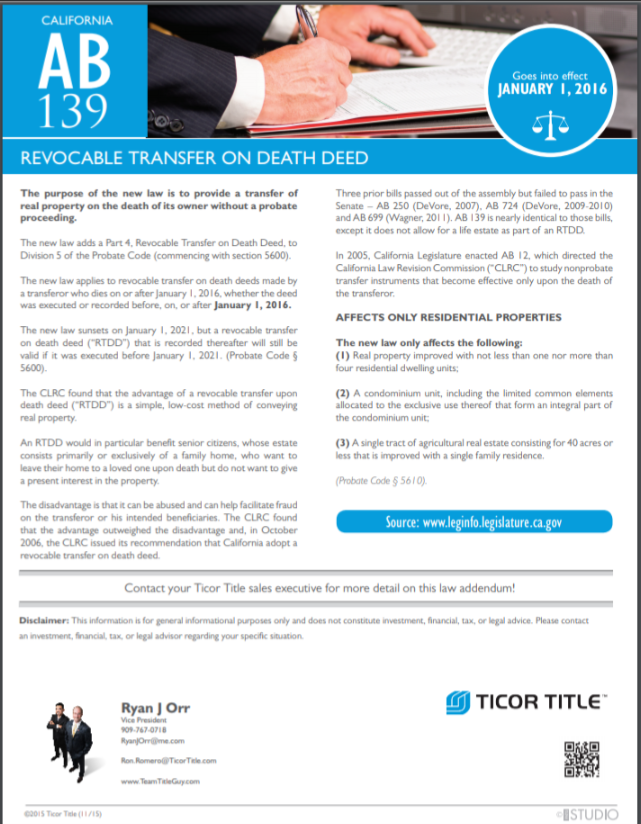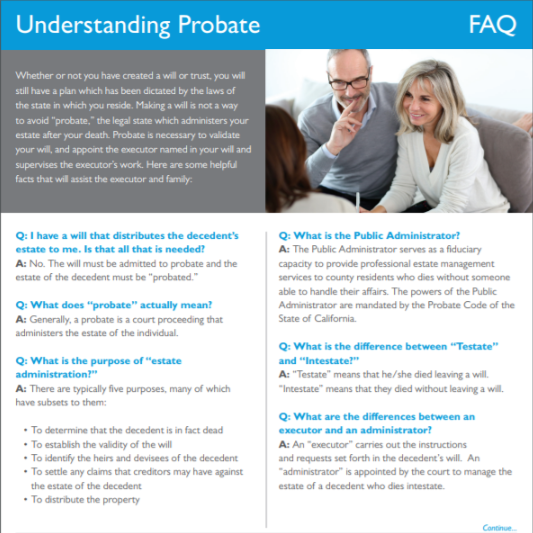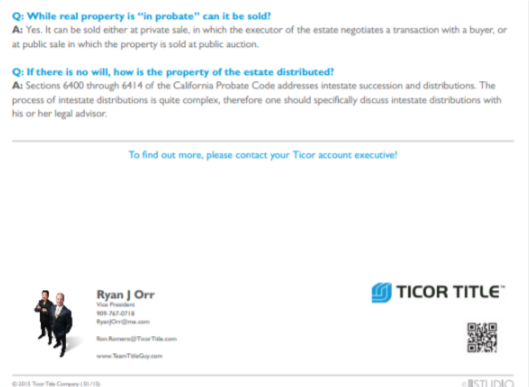In this session of Meeting with the Masters, we have Masters Tom Bernath and Jason Gaudy detailing the probate process and covering the big mistakes we make when handling a probate. We’ll break down the biggest points here…
First things first, there are only two ways to avoid a probate altogether: stay alive forever, or not own property when you die. While this seems impossible, there’s actually a few ways to do this:
- Joint tenancy allows property to automatically pass to the survivor upon death
- Community property with right of survivor-ship
- Trusts or family partnerships make it so the decedent does not own the property individually, and the successor(s) takes control of the property upon death. Revocable Transfer on Death deeds are some of the easiest ways around a probate.
- Revocable Transfer on Death deeds are a simple, inexpensive way to transfer real estate to someone else upon your death. They work similarly to a life insurance policy or a payable on death account at a bank because the asset passes to your named beneficiary upon your death outside the probate system.
- This is revocable at any point before death and is strongly suggested over an irrevocable transfer should something happen. RTDDs have come into question as they have been used to quickly avoid a probate on a dying person’s estate.
- They have led to many of the stories where someone comes in and convinces an elderly person to sign away everything and leave it all to one party out of nowhere. As such, they are difficult to insure, sometimes difficult to prove the competency of the deed’s signer, and all documentation must be present and in order for it to be permissible. More information is supplied below as an image.

Now, usually a client will be coming to you because they need a probate and not because they managed to find a way to live forever, so we’re going to cover the steps in a probate:
A potential client steps into your office and either has or does not have a will. If they have a will, there’s a pretty good chance that an executor has been appointed to manage the estate already. If not, you’ll have to work together to get an administrator appointed to manage the estate.
From there, we have to get the executor/administrator petitioned and a hearing will be held in a Court to be granted authority; there are two types of authority in a probate: full authority and limited authority. Generally, it’s best to just go for full authority. Full authority gives the Public Administrator (PA) the power to handle the majority of the estate process it does not mean the PA can do anything they wish,they must act in the best interests of the estate and their actions can be subject to examination later on by the court or a beneficiary but they have the authority to sell personal property, stocks, and real estate with little delay.
Despite its namesake, full authority does not mean autonomy or even really mean “full” authority. What it actually means is that the Public Administrator will have to submit something called a notice of proposed action which gives the beneficiaries a chance to object to an aforementioned action before it goes through if they have reason to believe it is not in best interest of the estate. Action can only be made if no objections are made within the 15 days. Limited authority gives no authority, virtually everything must be taken through the court and every step must be followed precisely and court guidance must be followed consistently which makes for a significantly longer and much more painful process.
Once authority has been decided, Letters of Administration are issued by the Court. Then comes a creditors period where creditors are notified and given 4 months to respond before we can get to the appraisal and inventory. From there we have the final petition for distribution with the court. During the petitioning phase, escrow can be opened and the property can start to be sorted out. We have the hearing next and as soon as that is completed, we can close escrow almost immediately if prepared to. The whole process generally takes a year assuming there are no major disputes or conflicts with the administrator and beneficiaries.
Important Probate Code Content and Documents:
- Independent Administration of Estates Act (IAEA) (Probate Code §§10400-10592)- this covers the aspect of full and limited authority, detailing everything from checking the box on probate forms for authority to exactly what a PA can and cannot do with their authority.
- Real Property of Small Value ($50,000) (P.C. §13200)- Six months have passed since death. The gross value of real property in the decedent’s estate located in California does not exceed $50,000 (happens rarely, usually with out-of-state residents whose only California real estate is a timeshare or vacant land in a remote location). A form entitled “Affidavit re Real Property of Small Value”, along with an appraisal must be filed with the Court Clerk, who signs the certificate on the form.
- Surviving Spouse’s Right to Dispose of Community Property (P.C. §13540)- 40 days have passed since death, the property was community property, the surviving or Administrator must record an affidavit stating that the statutory requirements have been satisfied. This allows the spouse to dispose of community property as they see fit by means of sale, lease, mortgage, etc. The procedure does not apply if a third party records a notice claiming an interest in the property. (P.C. §13541.)
- Decree of Final Distribution- A final judgment issued by the probate court that is conclusive as to the rights of the legatees, devisees and all beneficiaries and details their respective shares.
Things to keep in mind:
- The term “based on the fact pattern” is going to be key. If something comes into question or becomes an issue, but all procedure so far has been followed carefully and every party has been transparent with information, the court is likely to continue to permit actions. If it appears that any procedure has been ignored or it seems that some things are being handled below the board, this will slow down the process and increase risk all around.
- The average cost of a probate proceeding is between 5 and 10 percent.
- In the state of California it is possible to do an Order Determining Succession to Real Property, which creates a simplified probate proceeding. The only way to do this is if the gross value of the decedent’s real and personal property does not exceed $100,000 and a probate has not yet been filed.
- An Affidavit of Death of Surviving Spouse can rarely pass in lieu of a probate
- Community Property with Right of Survivor-ship is a good option if no trust has been made. This gives the benefits of community property and joint tenancy, meaning a probate can be avoided and there are additional tax beneficial incentives to do so. However, as the property is given to the survivor, it is no longer community property upon death and must be managed from there to avoid a probate. Estate tax exemption is $5,000,000 with a 35% estate tax for any amount over that limit.
- A court order given in a different state is not valid in the state of California without an ancillary probate.
- Just because a deed has been recorded does not mean that it cannot be objected or fought. A deed being recorded simply means that it has been documented properly, not that it is necessarily valid.
- A deed that is void for any reason such as fraud, undue influence, duress, mistake etc. passes no title. In such a case, there would
arguably be no bonafide purchaser. Therefore, the deed would be void, pass no title, and the property would be subject to the
return to the estate. - Living trusts work similar to a will, and they do not protect you like a corporation will.
Common Mistakes and Things to Avoid:
- Picking the wrong PA for a probate is the worst possible mistake to make. You want to look for someone who is good at peacekeeping. Choosing the wrong Administrator can make every single step of the probate more difficult as there may be constant dispute and therefore delay even with full authority.
- Talk your client out of doing a probate loan. It just isn’t worth it.
- Never, ever use an irrevocable living trust. All it does is make sure that nothing can be fixed if something were to happen with the appointed trustee(s).
- Avoid a short sale probate, and furthermore there should ideally be greater than $50,000 in total equity involved.
- If a property is in foreclosure, your time very limited if there is a trust deed sale date already, proceed with caution on these.
FAQ:



Comments(1)